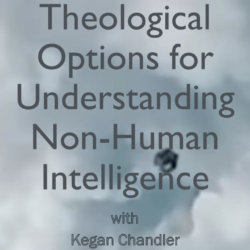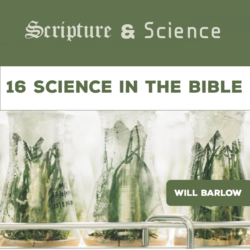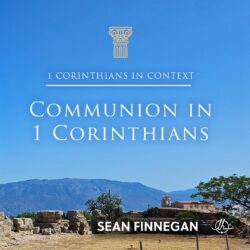Having looked at the basics of earth science last time, we are now ready to consider Noah’s Flood. As always you’ll learn the major options for interpreting this biblical event. Some Christians understand the flood to have been a local event, largely limited to the region of Mesopotamia. Others hold to the notion that this flood covered the entire planet, rising above even the highest mountains. No matter which position you take, you’ll have to answer key biblical and scientific questions.
Listen to this episode on Spotify or Apple Podcasts
See below for notes.
—— Links ——
- We are doing follow-up discussions to these episodes on YouTube. Check them out!
- See other episodes in this Scripture and Science Class
- Check out Barlow’s previous podcast episodes
- Learn more about and support the church Barlow and his team are starting in Louisville, KY, called Compass Christian Church
- Find more articles and audios by Barlow on his website: Study Driven Faith
- Support Restitutio by donating here
- Designate Restitutio as your charity of choice for Amazon purchases
- Join our Restitutio Facebook Group and follow Sean Finnegan on Twitter @RestitutioSF
- Leave a voice message via SpeakPipe with questions or comments and we may play them out on the air
- Intro music: Good Vibes by MBB Attribution-ShareAlike 3.0 Unported (CC BY-SA 3.0) Free Download / Stream: Music promoted by Audio Library.
- Who is Sean Finnegan? Read his bio here
—— Notes ——
Noah’s Flood
• Considerations
• Global or local?
• Evidence for Noah’s Flood
• Implications of Noah’s Flood
Considerations
• Rain before the flood?
• Plate tectonics and evolution
• Scope and evolution
• How big was the ark?
Rain before Noah’s flood?
Many have taught that, before Noah’s flood, there was no rain:
Genesis 2:5-6 When no bush of the field was yet in the land and no small plant of the field had yet sprung up–for the LORD God had not caused it to rain on the land, and there was no man to work the ground, and a mist was going up from the land and was watering the whole face of the ground–
Scholar Mark Futato suggests that “mist” should be translated as “rain.”
• In the context, there are two “problems”
• No rain
• No man to till the ground
• Thus, “mist” could equal “rain”
Reasons why “mist” could be better:
• If you hold late tectonic shift, mist would be required (“land” singular in Genesis 1:10)
• The sign of the rainbow — the rainbow is only physically possible with rain
• Possibly rain kicked off the modern water cycle – this answers the objection “where did the water go?”
Plate Tectonics and evolution
What we believe about plate tectonics impacts our view on evolution and the extent of Noah’s flood
• A small minority has proposed a more recent tectonic shift, which could account for mountain building after Noah’s flood
• The flip side is that there would likely be a need for fast evolution in this view
Scope and evolution
What we believe about the scope of Noah’s flood also impacts our view on evolution
• Localized flood proponents can handle the scientific side with much more ease
• Global flood proponents have some difficulties, including a potential need for fast evolution
How big was the ark?
Genesis 6:15-16 This is how you are to make it: the length of the ark 300 cubits, its breadth 50 cubits, and its height 30 cubits. Make a roof for the ark, and finish it to a cubit above, and set the door of the ark in its side. Make it with lower, second, and third decks.
Depending on how you reckon a cubit, that translates to 450 – 510 feet long.
John Whitcomb and Henry Morris estimate that the ark would have held the equivalent of 522 railcars.
They then go on to estimate that 1 such railcar could hold 240 sheep.
Global or local?
This is perhaps the most important question we can ask about Noah’s flood.
Global — impacted life around the world
Local — impacted all human life (all dwelling in Mesopotamia) but not all life
Arguments for a local flood:
Psalms 104:9 You set a boundary that they may not pass, so that they might not again cover the earth.
If God set a boundary to the waters in Genesis 1, then how could Noah’s flood have been global?
“Land” in Genesis 6-7 refers to the land of Mesopotamia, and even more specifically, to the inhabitants of the land.
Genesis 7:20 (KJV) Fifteen cubits upward did the waters prevail; and the mountains [hills] were covered.
Genesis 7:20 The waters prevailed above the mountains, covering them fifteen cubits deep.
To get around the language in the Bible that seems to state that all humans died in Noah’s flood (other than Noah and his family), some local flood proponents say that all humans lived in Mesopotamia when this flood took place.
There is evidence of a Mesopotamian flood around 5,000 years ago.
Arguments for a global flood:
Genesis 6:17 For behold, I will bring a flood of waters upon the earth to destroy all flesh in which is the breath of life under heaven. Everything that is on the earth shall die.
Genesis 7:19, 21 And the waters prevailed so mightily on the earth that all the high mountains under the whole heaven were covered.
And all flesh died that moved on the earth, birds, livestock, beasts, all swarming creatures that swarm on the earth, and all mankind.
• Has anyone heard of a localized flood that lasted 40 days and 40 nights that kept a boat floating for around a year?
• Why wouldn’t the people of Mesopotamia just flee the area when the rain started?
Genesis 9:11 I establish my covenant with you, that never again shall all flesh be cut off by the waters of the flood, and never again shall there be a flood to destroy the earth.”
Luke 17:27 They were eating and drinking and marrying and being given in marriage, until the day when Noah entered the ark, and the flood came and destroyed them all.
Evidence for Noah’s Flood
One of the strongest pieces of evidence for Noah’s flood is found in the historical record — basically every ancient civilization has a flood story.
“Scores and even hundreds of such traditions have been found in every part of the world, in both the Eastern and Western hemispheres; and common to most of them is the recollection of a great flood which once covered the earth and destroyed all but a tiny remnant of the human race.”
“Many of them, even those who have been found among the American Indians, tell of the building of a great ark which saved human and animal seed from total destruction by the Flood and which finally landed on a mountain.”
— John C. Whitcomb and Henry M. Morris, The Genesis Flood, page 48.
Geological evidence for Noah’s Flood:
• Seamounts – old islands that have now been submerged by water
• Submarine canyons
Implications of Noah’s Flood
How could Noah’s Flood impact life on the planet?
• Increase amount of water vapor in the atmosphere and decrease oxygen – this could explain the change in the length of life of people from before Noah’s Flood to after
• Change in atmospheric pressure could impact longevity as well
How did the humans, animals, and plants travel to their current locations?
• Land bridges
• Floating on air
• Recent tectonic separation
“In the year 1883, the island of Krakatoa in the Sunda Strait, between Java and Sumatra, was almost destroyed by a volcanic explosion that shook that entire part of the world. For twenty-five years practically nothing lived in the remnant of that volcanic island.”
“But ‘then then colonists began to arrive—a few mammals in 1908; a number of birds, lizards, and snakes; various mollusks, insects, and earthworms. Ninety percent of Krakatoa’s new inhabitants… were forms that could have arrived by air.’”
— John C. Whitcomb and Henry M. Morris, The Genesis Flood, pages 84-85.
Conclusion
There are a lot of things to consider in dealing with Noah’s Flood.
Take time to read the account and the references later in Scripture. Determine your perspective on global vs. local.
There are many ways to interpret the scientific evidence. However, the historical evidence is clear: there was an ancient, massive flood.







Hi Sean and Will, thanks for the informative episode. I have a question that is not directly related to the topic, but the question afterward caused me to think of it (you mentioned the kingdom that is to come), and it’s been something I’ve been wanting to ask for a while now.
I know that you always put a lot of emphasis on the kingdom of God and its centrality in the gospel message. This focus has been of great help to me, and just recently I’ve been re-reading the gospels to pay particular attention whenever this topic is discussed.
Anyway, now for my question; basically anywhere I go, when this topic comes up, people assume that the kingdom of God is a kingdom that is already here on this earth and that we’re somehow part of it. I’ve always found this very strange as evidently this world looks nothing like a godly kingdom. Additionally during my reading of the scriptures I have noticed it consistently seems to be presented or referred to as something that is yet to come.
Now maybe I’m just not a great listener, but despite the many episodes I’ve listened to, I am still not sure of your take on this. Would you likewise say that we already are part of the kingdom of God, or would you rather say that the kingdom is still to come (ie my current view).
Whenever I start asking more questions about it, generally all I get is talk about some ‘spiritualized’ kingdom instead of an actual one, and not really any convincing evidence to back up such claims.
Since this seems to be such an important topic to you, I was hoping you could help me out with a more useful explanation.
Kind regards, Mark
Mark,
Thanks for your question. I know Sean have a response at the end of the latest episode, but I also wanted to chime in here briefly.
I agree with Sean that the total fulfillment of the kingdom is when Jesus returns and when God’s will is done on earth as it is in heaven. But just as he said, there is a sense in which we can see the kingdom influencing our reality now. Some scholars, like NT Wright, have termed this “already and not yet.” For example, the spirit was originally prophesied as an “end times” thing (see Joel 2). But the spirit came early at Pentecost, and Paul calls it the down payment of our full inheritance in Ephesians 1.
So the way I would put it is that the kingdom is about God’s plan being actualized in the future: a society with only good and no bad for eternity. But the principles that we can see in that future: pure love, perfect justice, obedience to God, etc. should fuel our lives and examples now as Christians. As Sean said, we should act like citizens of the kingdom yet to come.
I hope to explore these ideas in a coming sermon series for the church I am beginning to pastor full time next week. Our first weekly service is in two and a half weeks.
Thanks for your excellent question.
Will
I appreciate Will’s perspective that the evidences from scripture and from history are quite strong for a universal (not just “massive”) flood. I think the scientific evidence is just as strong regarding mountain building, world-wide dispersion, the isolation of certain kinds in certain locations, and not “recent plate tectonics,” but the impossibility of plate tectonics and a more convincing interpretation of the assumed evidences for plate tectonics. Please see https://scriputralscrutiny.com/2017/04/06/294/ lessons 8 – 10 on a detailed exploration of these issues.